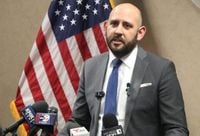In a pivotal decision that marks a significant shift in the prosecution of one of the deadliest mass shootings in U.S. history, El Paso District Attorney James Montoya announced on March 25, 2025, that he will no longer pursue the death penalty against Patrick Crusius, the gunman responsible for the racially motivated attack that took 23 lives and injured 22 others at a Walmart in El Paso on August 3, 2019. Montoya's decision was influenced by the overwhelming sentiment among victims' families who expressed a desire for closure rather than an extended legal battle.
Montoya, who took office in January 2025, explained that after meeting with the families of the victims, it became clear that many wanted the case resolved as quickly as possible, even if it meant foregoing the death penalty. "I could not in good conscience continue to seek the death penalty against the wishes of so many of the victims," he stated during a news conference. The plea deal will allow Crusius to plead guilty to capital murder and receive a sentence of life in prison without the possibility of parole, with a hearing scheduled for April 21.
Crusius, 26, had driven over 700 miles from his home in Allen, Texas, to El Paso, where he opened fire on shoppers, motivated by a racist ideology that he articulated in a manifesto posted online shortly before the attack. His actions were described as a response to what he termed the "Hispanic invasion of Texas." This brutal assault has been recognized as one of the most heinous hate crimes in recent U.S. history, targeting predominantly Hispanic individuals.
The decision not to pursue the death penalty represents a departure from the initial intentions of previous district attorneys. Jaime Esparza, who was in office at the time of the shooting, announced plans to seek capital punishment shortly after the incident. His successor, Yvonne Rosales, also expressed intentions to pursue the death penalty but resigned in 2022 amid allegations of misconduct and incompetence related to the case. Bill Hicks, who briefly held the position, aimed to proceed with the death penalty as well, but was unable to bring the case to trial.
Montoya's decision comes after years of delays and complications in the judicial process, which have left the community in limbo. He noted that pursuing the death penalty could have prolonged the case for several more years, potentially delaying a trial until 2028. "Realistically, the January 2026 timeframe for a trial was not realistic," Montoya said, emphasizing the need for a resolution for the victims' families.
Jessica Garcia, whose husband Guillermo "Memo" Garcia was the last victim to die from injuries sustained in the shooting, expressed mixed feelings about the decision. While she understands the desire for closure, she also feels that not pursuing the death penalty feels like a betrayal to her husband's memory. "It feels like giving Crusius exactly what he wants," she lamented, highlighting the emotional turmoil many families are experiencing.
Karla Romero, whose mother Gloria Irma Márquez was among those killed, urged the community to focus on preventing future violence rather than dwelling on the past. She emphasized the importance of addressing systemic issues such as racism and radicalization, stating, "Education serves as a tool to address these issues; knowledge is key." Romero called for investment in education and community resources to combat violence and promote peace.
Montoya acknowledged that not all families agreed with his decision, and some expressed feelings of confusion and betrayal. He stated that while some families wanted the death penalty pursued, the majority preferred to see the case concluded swiftly. He reiterated his belief in the death penalty but ultimately prioritized the wishes of the families who have endured years of legal uncertainty.
As part of the plea agreement, Crusius will waive his appellate rights, ensuring that he will serve his sentence without the possibility of appeal. He had already been sentenced to 90 consecutive life terms in federal court after pleading guilty to multiple hate crime charges in 2023. The federal court's decision not to pursue the death penalty was influenced by Crusius's mental health issues, including a diagnosis of schizoaffective disorder.
El Paso Catholic Bishop Mark Seitz praised Montoya's decision, stating, "While we believe that the community needs to be protected from anyone who would commit such a crime, our community will not be safer or better by seeking more bloodshed." His remarks reflect a broader sentiment among some community leaders who oppose the death penalty on moral grounds.
In the wake of Montoya's announcement, the community is left grappling with the implications of this decision. As families prepare to deliver victim impact statements during the upcoming plea hearing, the focus now shifts to healing and remembrance. The Walmart shooting has left an indelible mark on El Paso, and the community continues to seek ways to honor the victims while advocating for a future free from violence.
In conclusion, the decision not to pursue the death penalty against Patrick Crusius represents a complex interplay of legal, emotional, and ethical considerations. As the case moves toward resolution, the El Paso community remains united in its commitment to healing and preventing future tragedies.










